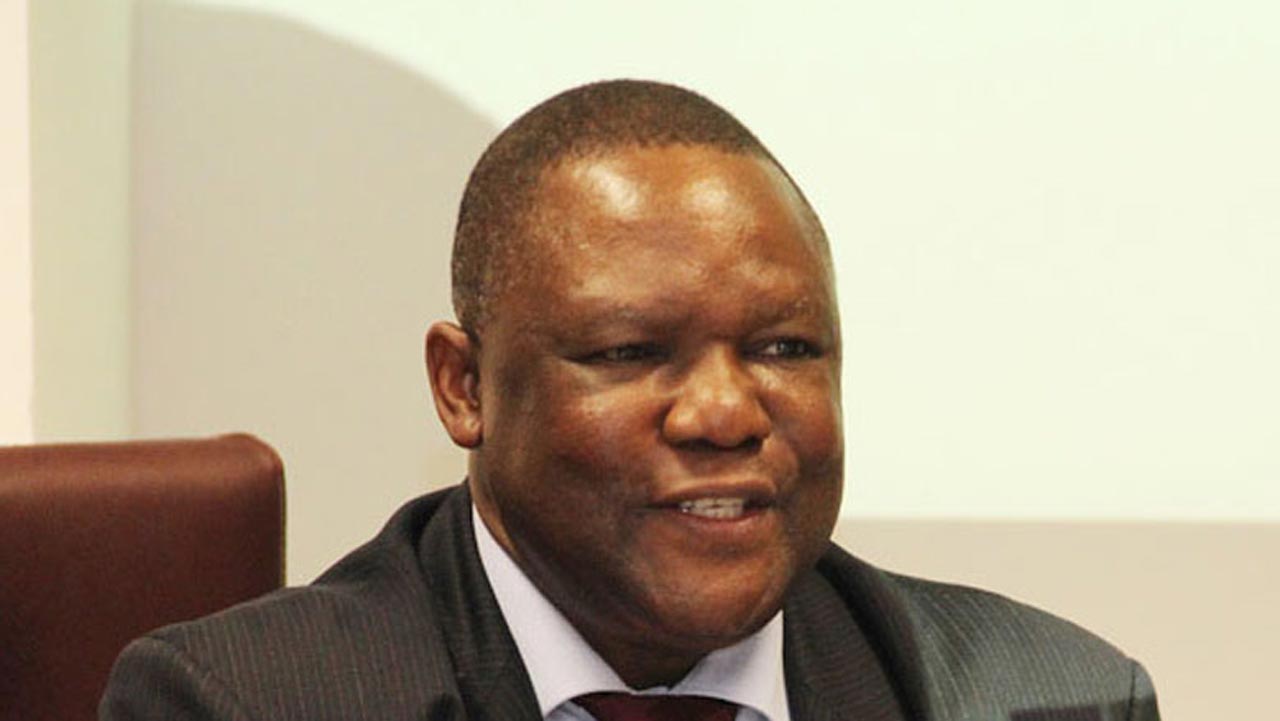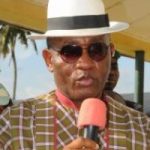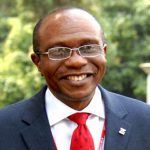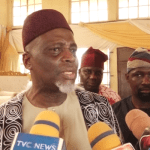TVC N. Dr Obadiah Mailafia, a former Deputy Governor of the Central Bank of Nigeria (CBN),has advocated the practice a social market economy that encourages fair competition.
Mailafia made the call in Abuja at a Roundtable organised by the Korad Adenuer Stiftung (KAS), a German NGO, with the theme “Social Market Economy: A tool for Economic and Social Development”.
According to him, such a system which creates employment, caters for citizens’ social welfare by providing amenities and security, among others, thereby advancing economic prosperity, will enable the country to exit recession.
He said every system needed sufficient competition within the framework of an open market system that prevents individual economic actors from exercising monopolistic market dominance, in order to function effectively
He explained that within a social market economy, the key responsibilities of government should centre on maintaining a regulatory environment that promotes fair competition and a level playing field for economic actors.
Mailafia, therefore, urged the government to discourage a market system that does not encourage competition and allow an open market for potential suppliers to enter so as to expand competition in the economy.
“Over the years, the economy of Nigeria has been controlled by a particular group of people which has led to the imprisonment of the economy.
“This has caused Nigerian consumers to be shortchanged for poor quality products at higher prices.
“What is advocated is not for government to set up companies but rather, invest in building a sound business environment and incentive-system that drives innovation.’’
Mailafia advised the government to learn from the social market economy model of Germany, noting that it is been a critical factor to Germany’s prosperity for more than half a century.
According to him, Nigeria and Germany share a lot of similarities as populous nations, regional powers in their respective regions, adding: “If it can work in Germany, it should work in Nigeria.”
He said that as a matter of urgency, Nigeria needed to diversify its economy to become a producers of goods rather than just a supplier of raw materials.
Mailafia said that in order to achieve a thriving economy, there should be a central market principle that would control the rate of inflation, with the CBN ensuring price stability.
He, therefore, urged the government to promote Small and Medium Enterprises (SMEs), which he described as the backbone of the national economy.
Furthermore, he urged the government to also boost education, ensure human capital development and training, with a focus developing the skills of youths.
In a remark, Mrs Hildegard Behrendt-Kigozi, the Resident Representative of KAS in Nigeria, said the workshop was organised to create an opportunity for stakeholders to brainstorm on how to encourage a social market economy in Nigeria.
She said the discussion was timely in order to harvest suggestions on possible ways to boost and diversify the economy as well as get it out of recession.
Behrendt-Kigozi disclosed that the thriving economy of Germany was built on the principles of a social market economy championed by the first post-war German Chancellor, Korad Adenaeur.
She said that this led to the revamp of the nation’s economy by introducing national competitiveness, export drive, vibrant SMEs, economic and monetary stability, subsidised housing and child benefits, among others.
Behrendt-Kigozi said that KAS mandate, it is committed to contribute in building a Nigeria where democracy, rule of law, and prosperity for all prevails.
TVC N. Dr Obadiah Mailafia, a former Deputy Governor of the Central Bank of Nigeria (CBN),has advocated the practice a social market economy that encourages fair competition.
Mailafia made the call in Abuja at a Roundtable organised by the Korad Adenuer Stiftung (KAS), a German NGO, with the theme “Social Market Economy: A tool for Economic and Social Development”.
According to him, such a system which creates employment, caters for citizens’ social welfare by providing amenities and security, among others, thereby advancing economic prosperity, will enable the country to exit recession.
He said every system needed sufficient competition within the framework of an open market system that prevents individual economic actors from exercising monopolistic market dominance, in order to function effectively
He explained that within a social market economy, the key responsibilities of government should centre on maintaining a regulatory environment that promotes fair competition and a level playing field for economic actors.
Mailafia, therefore, urged the government to discourage a market system that does not encourage competition and allow an open market for potential suppliers to enter so as to expand competition in the economy.
“Over the years, the economy of Nigeria has been controlled by a particular group of people which has led to the imprisonment of the economy.
“This has caused Nigerian consumers to be shortchanged for poor quality products at higher prices.
“What is advocated is not for government to set up companies but rather, invest in building a sound business environment and incentive-system that drives innovation.’’
Mailafia advised the government to learn from the social market economy model of Germany, noting that it is been a critical factor to Germany’s prosperity for more than half a century.
According to him, Nigeria and Germany share a lot of similarities as populous nations, regional powers in their respective regions, adding: “If it can work in Germany, it should work in Nigeria.”
He said that as a matter of urgency, Nigeria needed to diversify its economy to become a producers of goods rather than just a supplier of raw materials.
Mailafia said that in order to achieve a thriving economy, there should be a central market principle that would control the rate of inflation, with the CBN ensuring price stability.
He, therefore, urged the government to promote Small and Medium Enterprises (SMEs), which he described as the backbone of the national economy.
Furthermore, he urged the government to also boost education, ensure human capital development and training, with a focus developing the skills of youths.
In a remark, Mrs Hildegard Behrendt-Kigozi, the Resident Representative of KAS in Nigeria, said the workshop was organised to create an opportunity for stakeholders to brainstorm on how to encourage a social market economy in Nigeria.
She said the discussion was timely in order to harvest suggestions on possible ways to boost and diversify the economy as well as get it out of recession.
Behrendt-Kigozi disclosed that the thriving economy of Germany was built on the principles of a social market economy championed by the first post-war German Chancellor, Korad Adenaeur.
She said that this led to the revamp of the nation’s economy by introducing national competitiveness, export drive, vibrant SMEs, economic and monetary stability, subsidised housing and child benefits, among others.
Behrendt-Kigozi said that KAS mandate, it is committed to contribute in building a Nigeria where democracy, rule of law, and prosperity for all prevails.
TVC N. Dr Obadiah Mailafia, a former Deputy Governor of the Central Bank of Nigeria (CBN),has advocated the practice a social market economy that encourages fair competition.
Mailafia made the call in Abuja at a Roundtable organised by the Korad Adenuer Stiftung (KAS), a German NGO, with the theme “Social Market Economy: A tool for Economic and Social Development”.
According to him, such a system which creates employment, caters for citizens’ social welfare by providing amenities and security, among others, thereby advancing economic prosperity, will enable the country to exit recession.
He said every system needed sufficient competition within the framework of an open market system that prevents individual economic actors from exercising monopolistic market dominance, in order to function effectively
He explained that within a social market economy, the key responsibilities of government should centre on maintaining a regulatory environment that promotes fair competition and a level playing field for economic actors.
Mailafia, therefore, urged the government to discourage a market system that does not encourage competition and allow an open market for potential suppliers to enter so as to expand competition in the economy.
“Over the years, the economy of Nigeria has been controlled by a particular group of people which has led to the imprisonment of the economy.
“This has caused Nigerian consumers to be shortchanged for poor quality products at higher prices.
“What is advocated is not for government to set up companies but rather, invest in building a sound business environment and incentive-system that drives innovation.’’
Mailafia advised the government to learn from the social market economy model of Germany, noting that it is been a critical factor to Germany’s prosperity for more than half a century.
According to him, Nigeria and Germany share a lot of similarities as populous nations, regional powers in their respective regions, adding: “If it can work in Germany, it should work in Nigeria.”
He said that as a matter of urgency, Nigeria needed to diversify its economy to become a producers of goods rather than just a supplier of raw materials.
Mailafia said that in order to achieve a thriving economy, there should be a central market principle that would control the rate of inflation, with the CBN ensuring price stability.
He, therefore, urged the government to promote Small and Medium Enterprises (SMEs), which he described as the backbone of the national economy.
Furthermore, he urged the government to also boost education, ensure human capital development and training, with a focus developing the skills of youths.
In a remark, Mrs Hildegard Behrendt-Kigozi, the Resident Representative of KAS in Nigeria, said the workshop was organised to create an opportunity for stakeholders to brainstorm on how to encourage a social market economy in Nigeria.
She said the discussion was timely in order to harvest suggestions on possible ways to boost and diversify the economy as well as get it out of recession.
Behrendt-Kigozi disclosed that the thriving economy of Germany was built on the principles of a social market economy championed by the first post-war German Chancellor, Korad Adenaeur.
She said that this led to the revamp of the nation’s economy by introducing national competitiveness, export drive, vibrant SMEs, economic and monetary stability, subsidised housing and child benefits, among others.
Behrendt-Kigozi said that KAS mandate, it is committed to contribute in building a Nigeria where democracy, rule of law, and prosperity for all prevails.
TVC N. Dr Obadiah Mailafia, a former Deputy Governor of the Central Bank of Nigeria (CBN),has advocated the practice a social market economy that encourages fair competition.
Mailafia made the call in Abuja at a Roundtable organised by the Korad Adenuer Stiftung (KAS), a German NGO, with the theme “Social Market Economy: A tool for Economic and Social Development”.
According to him, such a system which creates employment, caters for citizens’ social welfare by providing amenities and security, among others, thereby advancing economic prosperity, will enable the country to exit recession.
He said every system needed sufficient competition within the framework of an open market system that prevents individual economic actors from exercising monopolistic market dominance, in order to function effectively
He explained that within a social market economy, the key responsibilities of government should centre on maintaining a regulatory environment that promotes fair competition and a level playing field for economic actors.
Mailafia, therefore, urged the government to discourage a market system that does not encourage competition and allow an open market for potential suppliers to enter so as to expand competition in the economy.
“Over the years, the economy of Nigeria has been controlled by a particular group of people which has led to the imprisonment of the economy.
“This has caused Nigerian consumers to be shortchanged for poor quality products at higher prices.
“What is advocated is not for government to set up companies but rather, invest in building a sound business environment and incentive-system that drives innovation.’’
Mailafia advised the government to learn from the social market economy model of Germany, noting that it is been a critical factor to Germany’s prosperity for more than half a century.
According to him, Nigeria and Germany share a lot of similarities as populous nations, regional powers in their respective regions, adding: “If it can work in Germany, it should work in Nigeria.”
He said that as a matter of urgency, Nigeria needed to diversify its economy to become a producers of goods rather than just a supplier of raw materials.
Mailafia said that in order to achieve a thriving economy, there should be a central market principle that would control the rate of inflation, with the CBN ensuring price stability.
He, therefore, urged the government to promote Small and Medium Enterprises (SMEs), which he described as the backbone of the national economy.
Furthermore, he urged the government to also boost education, ensure human capital development and training, with a focus developing the skills of youths.
In a remark, Mrs Hildegard Behrendt-Kigozi, the Resident Representative of KAS in Nigeria, said the workshop was organised to create an opportunity for stakeholders to brainstorm on how to encourage a social market economy in Nigeria.
She said the discussion was timely in order to harvest suggestions on possible ways to boost and diversify the economy as well as get it out of recession.
Behrendt-Kigozi disclosed that the thriving economy of Germany was built on the principles of a social market economy championed by the first post-war German Chancellor, Korad Adenaeur.
She said that this led to the revamp of the nation’s economy by introducing national competitiveness, export drive, vibrant SMEs, economic and monetary stability, subsidised housing and child benefits, among others.
Behrendt-Kigozi said that KAS mandate, it is committed to contribute in building a Nigeria where democracy, rule of law, and prosperity for all prevails.
TVC N. Dr Obadiah Mailafia, a former Deputy Governor of the Central Bank of Nigeria (CBN),has advocated the practice a social market economy that encourages fair competition.
Mailafia made the call in Abuja at a Roundtable organised by the Korad Adenuer Stiftung (KAS), a German NGO, with the theme “Social Market Economy: A tool for Economic and Social Development”.
According to him, such a system which creates employment, caters for citizens’ social welfare by providing amenities and security, among others, thereby advancing economic prosperity, will enable the country to exit recession.
He said every system needed sufficient competition within the framework of an open market system that prevents individual economic actors from exercising monopolistic market dominance, in order to function effectively
He explained that within a social market economy, the key responsibilities of government should centre on maintaining a regulatory environment that promotes fair competition and a level playing field for economic actors.
Mailafia, therefore, urged the government to discourage a market system that does not encourage competition and allow an open market for potential suppliers to enter so as to expand competition in the economy.
“Over the years, the economy of Nigeria has been controlled by a particular group of people which has led to the imprisonment of the economy.
“This has caused Nigerian consumers to be shortchanged for poor quality products at higher prices.
“What is advocated is not for government to set up companies but rather, invest in building a sound business environment and incentive-system that drives innovation.’’
Mailafia advised the government to learn from the social market economy model of Germany, noting that it is been a critical factor to Germany’s prosperity for more than half a century.
According to him, Nigeria and Germany share a lot of similarities as populous nations, regional powers in their respective regions, adding: “If it can work in Germany, it should work in Nigeria.”
He said that as a matter of urgency, Nigeria needed to diversify its economy to become a producers of goods rather than just a supplier of raw materials.
Mailafia said that in order to achieve a thriving economy, there should be a central market principle that would control the rate of inflation, with the CBN ensuring price stability.
He, therefore, urged the government to promote Small and Medium Enterprises (SMEs), which he described as the backbone of the national economy.
Furthermore, he urged the government to also boost education, ensure human capital development and training, with a focus developing the skills of youths.
In a remark, Mrs Hildegard Behrendt-Kigozi, the Resident Representative of KAS in Nigeria, said the workshop was organised to create an opportunity for stakeholders to brainstorm on how to encourage a social market economy in Nigeria.
She said the discussion was timely in order to harvest suggestions on possible ways to boost and diversify the economy as well as get it out of recession.
Behrendt-Kigozi disclosed that the thriving economy of Germany was built on the principles of a social market economy championed by the first post-war German Chancellor, Korad Adenaeur.
She said that this led to the revamp of the nation’s economy by introducing national competitiveness, export drive, vibrant SMEs, economic and monetary stability, subsidised housing and child benefits, among others.
Behrendt-Kigozi said that KAS mandate, it is committed to contribute in building a Nigeria where democracy, rule of law, and prosperity for all prevails.
TVC N. Dr Obadiah Mailafia, a former Deputy Governor of the Central Bank of Nigeria (CBN),has advocated the practice a social market economy that encourages fair competition.
Mailafia made the call in Abuja at a Roundtable organised by the Korad Adenuer Stiftung (KAS), a German NGO, with the theme “Social Market Economy: A tool for Economic and Social Development”.
According to him, such a system which creates employment, caters for citizens’ social welfare by providing amenities and security, among others, thereby advancing economic prosperity, will enable the country to exit recession.
He said every system needed sufficient competition within the framework of an open market system that prevents individual economic actors from exercising monopolistic market dominance, in order to function effectively
He explained that within a social market economy, the key responsibilities of government should centre on maintaining a regulatory environment that promotes fair competition and a level playing field for economic actors.
Mailafia, therefore, urged the government to discourage a market system that does not encourage competition and allow an open market for potential suppliers to enter so as to expand competition in the economy.
“Over the years, the economy of Nigeria has been controlled by a particular group of people which has led to the imprisonment of the economy.
“This has caused Nigerian consumers to be shortchanged for poor quality products at higher prices.
“What is advocated is not for government to set up companies but rather, invest in building a sound business environment and incentive-system that drives innovation.’’
Mailafia advised the government to learn from the social market economy model of Germany, noting that it is been a critical factor to Germany’s prosperity for more than half a century.
According to him, Nigeria and Germany share a lot of similarities as populous nations, regional powers in their respective regions, adding: “If it can work in Germany, it should work in Nigeria.”
He said that as a matter of urgency, Nigeria needed to diversify its economy to become a producers of goods rather than just a supplier of raw materials.
Mailafia said that in order to achieve a thriving economy, there should be a central market principle that would control the rate of inflation, with the CBN ensuring price stability.
He, therefore, urged the government to promote Small and Medium Enterprises (SMEs), which he described as the backbone of the national economy.
Furthermore, he urged the government to also boost education, ensure human capital development and training, with a focus developing the skills of youths.
In a remark, Mrs Hildegard Behrendt-Kigozi, the Resident Representative of KAS in Nigeria, said the workshop was organised to create an opportunity for stakeholders to brainstorm on how to encourage a social market economy in Nigeria.
She said the discussion was timely in order to harvest suggestions on possible ways to boost and diversify the economy as well as get it out of recession.
Behrendt-Kigozi disclosed that the thriving economy of Germany was built on the principles of a social market economy championed by the first post-war German Chancellor, Korad Adenaeur.
She said that this led to the revamp of the nation’s economy by introducing national competitiveness, export drive, vibrant SMEs, economic and monetary stability, subsidised housing and child benefits, among others.
Behrendt-Kigozi said that KAS mandate, it is committed to contribute in building a Nigeria where democracy, rule of law, and prosperity for all prevails.
TVC N. Dr Obadiah Mailafia, a former Deputy Governor of the Central Bank of Nigeria (CBN),has advocated the practice a social market economy that encourages fair competition.
Mailafia made the call in Abuja at a Roundtable organised by the Korad Adenuer Stiftung (KAS), a German NGO, with the theme “Social Market Economy: A tool for Economic and Social Development”.
According to him, such a system which creates employment, caters for citizens’ social welfare by providing amenities and security, among others, thereby advancing economic prosperity, will enable the country to exit recession.
He said every system needed sufficient competition within the framework of an open market system that prevents individual economic actors from exercising monopolistic market dominance, in order to function effectively
He explained that within a social market economy, the key responsibilities of government should centre on maintaining a regulatory environment that promotes fair competition and a level playing field for economic actors.
Mailafia, therefore, urged the government to discourage a market system that does not encourage competition and allow an open market for potential suppliers to enter so as to expand competition in the economy.
“Over the years, the economy of Nigeria has been controlled by a particular group of people which has led to the imprisonment of the economy.
“This has caused Nigerian consumers to be shortchanged for poor quality products at higher prices.
“What is advocated is not for government to set up companies but rather, invest in building a sound business environment and incentive-system that drives innovation.’’
Mailafia advised the government to learn from the social market economy model of Germany, noting that it is been a critical factor to Germany’s prosperity for more than half a century.
According to him, Nigeria and Germany share a lot of similarities as populous nations, regional powers in their respective regions, adding: “If it can work in Germany, it should work in Nigeria.”
He said that as a matter of urgency, Nigeria needed to diversify its economy to become a producers of goods rather than just a supplier of raw materials.
Mailafia said that in order to achieve a thriving economy, there should be a central market principle that would control the rate of inflation, with the CBN ensuring price stability.
He, therefore, urged the government to promote Small and Medium Enterprises (SMEs), which he described as the backbone of the national economy.
Furthermore, he urged the government to also boost education, ensure human capital development and training, with a focus developing the skills of youths.
In a remark, Mrs Hildegard Behrendt-Kigozi, the Resident Representative of KAS in Nigeria, said the workshop was organised to create an opportunity for stakeholders to brainstorm on how to encourage a social market economy in Nigeria.
She said the discussion was timely in order to harvest suggestions on possible ways to boost and diversify the economy as well as get it out of recession.
Behrendt-Kigozi disclosed that the thriving economy of Germany was built on the principles of a social market economy championed by the first post-war German Chancellor, Korad Adenaeur.
She said that this led to the revamp of the nation’s economy by introducing national competitiveness, export drive, vibrant SMEs, economic and monetary stability, subsidised housing and child benefits, among others.
Behrendt-Kigozi said that KAS mandate, it is committed to contribute in building a Nigeria where democracy, rule of law, and prosperity for all prevails.
TVC N. Dr Obadiah Mailafia, a former Deputy Governor of the Central Bank of Nigeria (CBN),has advocated the practice a social market economy that encourages fair competition.
Mailafia made the call in Abuja at a Roundtable organised by the Korad Adenuer Stiftung (KAS), a German NGO, with the theme “Social Market Economy: A tool for Economic and Social Development”.
According to him, such a system which creates employment, caters for citizens’ social welfare by providing amenities and security, among others, thereby advancing economic prosperity, will enable the country to exit recession.
He said every system needed sufficient competition within the framework of an open market system that prevents individual economic actors from exercising monopolistic market dominance, in order to function effectively
He explained that within a social market economy, the key responsibilities of government should centre on maintaining a regulatory environment that promotes fair competition and a level playing field for economic actors.
Mailafia, therefore, urged the government to discourage a market system that does not encourage competition and allow an open market for potential suppliers to enter so as to expand competition in the economy.
“Over the years, the economy of Nigeria has been controlled by a particular group of people which has led to the imprisonment of the economy.
“This has caused Nigerian consumers to be shortchanged for poor quality products at higher prices.
“What is advocated is not for government to set up companies but rather, invest in building a sound business environment and incentive-system that drives innovation.’’
Mailafia advised the government to learn from the social market economy model of Germany, noting that it is been a critical factor to Germany’s prosperity for more than half a century.
According to him, Nigeria and Germany share a lot of similarities as populous nations, regional powers in their respective regions, adding: “If it can work in Germany, it should work in Nigeria.”
He said that as a matter of urgency, Nigeria needed to diversify its economy to become a producers of goods rather than just a supplier of raw materials.
Mailafia said that in order to achieve a thriving economy, there should be a central market principle that would control the rate of inflation, with the CBN ensuring price stability.
He, therefore, urged the government to promote Small and Medium Enterprises (SMEs), which he described as the backbone of the national economy.
Furthermore, he urged the government to also boost education, ensure human capital development and training, with a focus developing the skills of youths.
In a remark, Mrs Hildegard Behrendt-Kigozi, the Resident Representative of KAS in Nigeria, said the workshop was organised to create an opportunity for stakeholders to brainstorm on how to encourage a social market economy in Nigeria.
She said the discussion was timely in order to harvest suggestions on possible ways to boost and diversify the economy as well as get it out of recession.
Behrendt-Kigozi disclosed that the thriving economy of Germany was built on the principles of a social market economy championed by the first post-war German Chancellor, Korad Adenaeur.
She said that this led to the revamp of the nation’s economy by introducing national competitiveness, export drive, vibrant SMEs, economic and monetary stability, subsidised housing and child benefits, among others.
Behrendt-Kigozi said that KAS mandate, it is committed to contribute in building a Nigeria where democracy, rule of law, and prosperity for all prevails.














